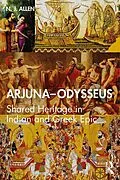Bringing together the study of the Greek classics and Indology, Arjuna-Odysseus provides a comparative analysis of the shared heritage of the Mahabharata and early Greek traditions presented in the texts of Homer and Hesiod.
Building on the ethnographic theories of Durkheim, Mauss, and Dumont, the volume explores the convergences and rapprochements between the Mahabharata and the Greek texts. In exploring the networks of similarities between the two epic traditions, it also reformulates the theory of Georges Dumézil regarding Indo-European cultural comparativism. It includes a detailed comparison between journeys undertaken by the two epic heroes - Odysseus and Arjuna - and more generally, it ranges across the philosophical ideas of these cultures, and the epic traditions, metaphors, and archetypes that define the cultural ideology of ancient Greece and India.
This book will be useful to scholars and researchers of Indo-European comparativism, social and cultural anthropology, classical literature, Indology, cultural and post-colonial studies, philosophy and religion, as well as to those who love the Indian and Greek epics.
Autorentext
N. J. Allen is a social anthropologist and a retired Reader in the Social Anthropology of South Asia, University of Oxford, UK. His research interests are Himalayan studies, world-historical approach to kinship systems, sociology of Durkheim and more especially Mauss, and Indo-European cultural comparativism.
Klappentext
Bringing together the study of the Greek classics and Indology, Arjuna-Odysseus provides a comparative analysis of the shared heritage of the Mahabharata and early Greek traditions presented in the texts of Homer and Hesiod.
Building on the ethnographic theories of Durkheim, Mauss, and Dumont, the volume explores the convergences and rapprochements between the Mahabharata and the Greek texts. In exploring the networks of similarities between the two epic traditions, it also reformulates the theory of Georges Dumézil regarding Indo-European cultural comparativism. It includes a detailed comparison between journeys undertaken by the two epic heroes - Odysseus and Arjuna - and more generally, it ranges across the philosophical ideas of these cultures, and the epic traditions, metaphors, and archetypes that define the cultural ideology of ancient Greece and India.
This book will be useful to scholars and researchers of Indo-European comparativism, social and cultural anthropology, classical literature, Indology, cultural and post-colonial studies, philosophy and religion, as well as to those who love the Indian and Greek epics.
Inhalt
List of figures. List of tables. Acknowledgements. List of abbreviations. Signs. Introduction 1. A starting point 2. Five relationships 3. Homer's simile 4. Hero and horse 5. Yoga 6. Crocodiles and nymphs 7. Monkey and dog 8. Durga and Athena 9. Draupadi and Penelope 10. Bhis ma and Sarpedon 11. Hesiod's Succession Myth 12. Five elements 13. Rings and rotations 14. Achilles' shield 15. Dumézil and Dumont 16. Yudhis hira and Agamemnon 17. Kauravas and suitors 18. Hanging over abyss 19. Gods descend to battlefield 20. Heroes and supercategories 21. Cyavana and Prometheus 22. Telemachy 23. Dröa and Chryses 24. Asvatthaman and the Wooden Horse. Bibliography. Index.
